Current Issues in Accounting: Australian Policies Report
VerifiedAdded on 2022/12/29
|6
|1165
|33
Report
AI Summary
This report provides an overview of Australian accounting policies, detailing the rules, procedures, and practices used in financial statement preparation. It emphasizes the importance of consistency and the application of key principles such as fair value measurement, full disclosure, conservatism, and revenue recognition. The report also addresses the selection of accounting policies when specific standards are absent, highlighting the potential for biased professional judgment and creative accounting. It outlines the procedure for choosing appropriate policies, including referencing existing standards, partially relevant standards, and the conceptual framework. The report stresses the need for consistent application to facilitate comparison and ensure a true and fair view of financial performance.
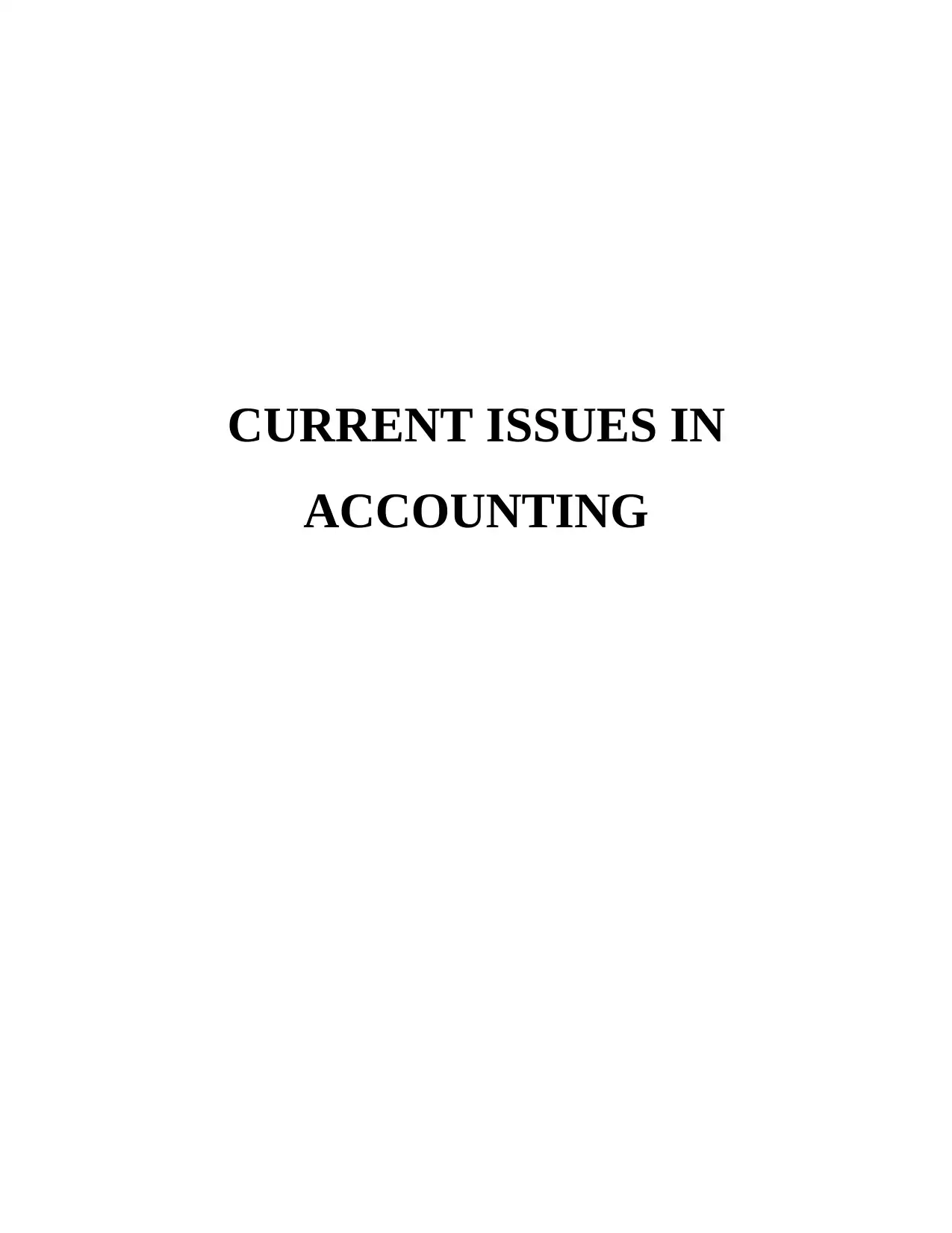
CURRENT ISSUES IN
ACCOUNTING
ACCOUNTING
Paraphrase This Document
Need a fresh take? Get an instant paraphrase of this document with our AI Paraphraser
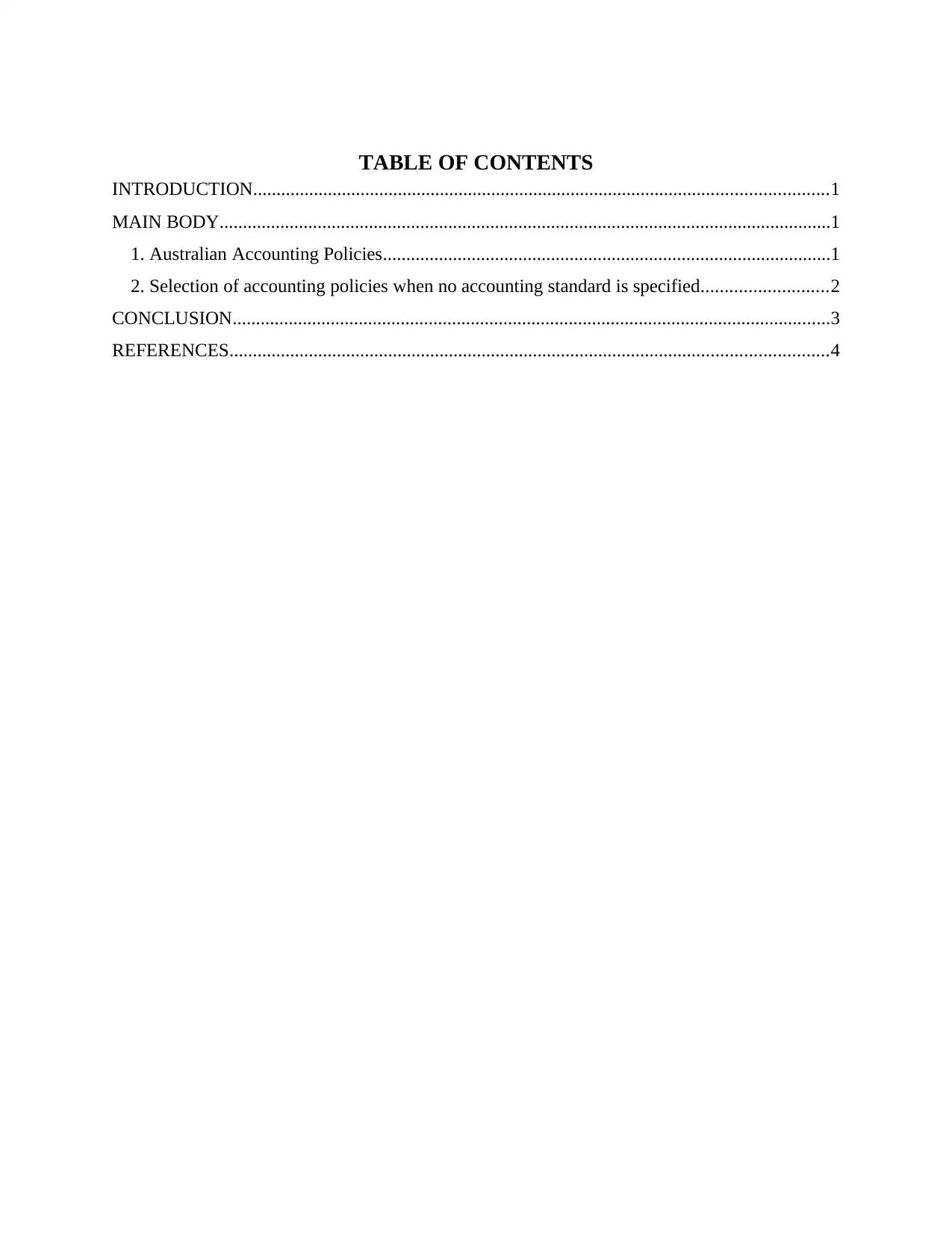
TABLE OF CONTENTS
INTRODUCTION...........................................................................................................................1
MAIN BODY...................................................................................................................................1
1. Australian Accounting Policies................................................................................................1
2. Selection of accounting policies when no accounting standard is specified...........................2
CONCLUSION................................................................................................................................3
REFERENCES................................................................................................................................4
INTRODUCTION...........................................................................................................................1
MAIN BODY...................................................................................................................................1
1. Australian Accounting Policies................................................................................................1
2. Selection of accounting policies when no accounting standard is specified...........................2
CONCLUSION................................................................................................................................3
REFERENCES................................................................................................................................4
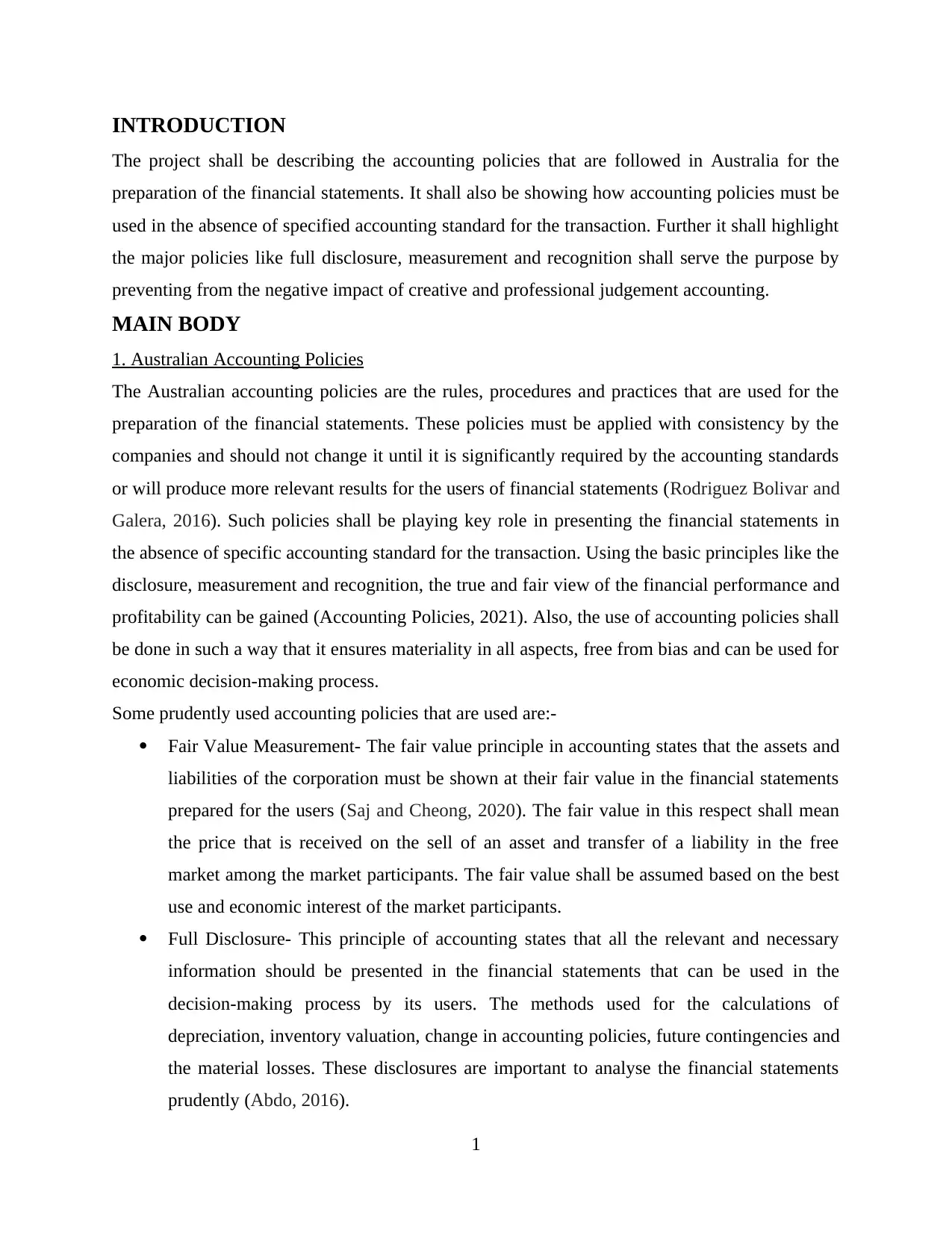
INTRODUCTION
The project shall be describing the accounting policies that are followed in Australia for the
preparation of the financial statements. It shall also be showing how accounting policies must be
used in the absence of specified accounting standard for the transaction. Further it shall highlight
the major policies like full disclosure, measurement and recognition shall serve the purpose by
preventing from the negative impact of creative and professional judgement accounting.
MAIN BODY
1. Australian Accounting Policies
The Australian accounting policies are the rules, procedures and practices that are used for the
preparation of the financial statements. These policies must be applied with consistency by the
companies and should not change it until it is significantly required by the accounting standards
or will produce more relevant results for the users of financial statements (Rodriguez Bolivar and
Galera, 2016). Such policies shall be playing key role in presenting the financial statements in
the absence of specific accounting standard for the transaction. Using the basic principles like the
disclosure, measurement and recognition, the true and fair view of the financial performance and
profitability can be gained (Accounting Policies, 2021). Also, the use of accounting policies shall
be done in such a way that it ensures materiality in all aspects, free from bias and can be used for
economic decision-making process.
Some prudently used accounting policies that are used are:-
Fair Value Measurement- The fair value principle in accounting states that the assets and
liabilities of the corporation must be shown at their fair value in the financial statements
prepared for the users (Saj and Cheong, 2020). The fair value in this respect shall mean
the price that is received on the sell of an asset and transfer of a liability in the free
market among the market participants. The fair value shall be assumed based on the best
use and economic interest of the market participants.
Full Disclosure- This principle of accounting states that all the relevant and necessary
information should be presented in the financial statements that can be used in the
decision-making process by its users. The methods used for the calculations of
depreciation, inventory valuation, change in accounting policies, future contingencies and
the material losses. These disclosures are important to analyse the financial statements
prudently (Abdo, 2016).
1
The project shall be describing the accounting policies that are followed in Australia for the
preparation of the financial statements. It shall also be showing how accounting policies must be
used in the absence of specified accounting standard for the transaction. Further it shall highlight
the major policies like full disclosure, measurement and recognition shall serve the purpose by
preventing from the negative impact of creative and professional judgement accounting.
MAIN BODY
1. Australian Accounting Policies
The Australian accounting policies are the rules, procedures and practices that are used for the
preparation of the financial statements. These policies must be applied with consistency by the
companies and should not change it until it is significantly required by the accounting standards
or will produce more relevant results for the users of financial statements (Rodriguez Bolivar and
Galera, 2016). Such policies shall be playing key role in presenting the financial statements in
the absence of specific accounting standard for the transaction. Using the basic principles like the
disclosure, measurement and recognition, the true and fair view of the financial performance and
profitability can be gained (Accounting Policies, 2021). Also, the use of accounting policies shall
be done in such a way that it ensures materiality in all aspects, free from bias and can be used for
economic decision-making process.
Some prudently used accounting policies that are used are:-
Fair Value Measurement- The fair value principle in accounting states that the assets and
liabilities of the corporation must be shown at their fair value in the financial statements
prepared for the users (Saj and Cheong, 2020). The fair value in this respect shall mean
the price that is received on the sell of an asset and transfer of a liability in the free
market among the market participants. The fair value shall be assumed based on the best
use and economic interest of the market participants.
Full Disclosure- This principle of accounting states that all the relevant and necessary
information should be presented in the financial statements that can be used in the
decision-making process by its users. The methods used for the calculations of
depreciation, inventory valuation, change in accounting policies, future contingencies and
the material losses. These disclosures are important to analyse the financial statements
prudently (Abdo, 2016).
1
⊘ This is a preview!⊘
Do you want full access?
Subscribe today to unlock all pages.

Trusted by 1+ million students worldwide
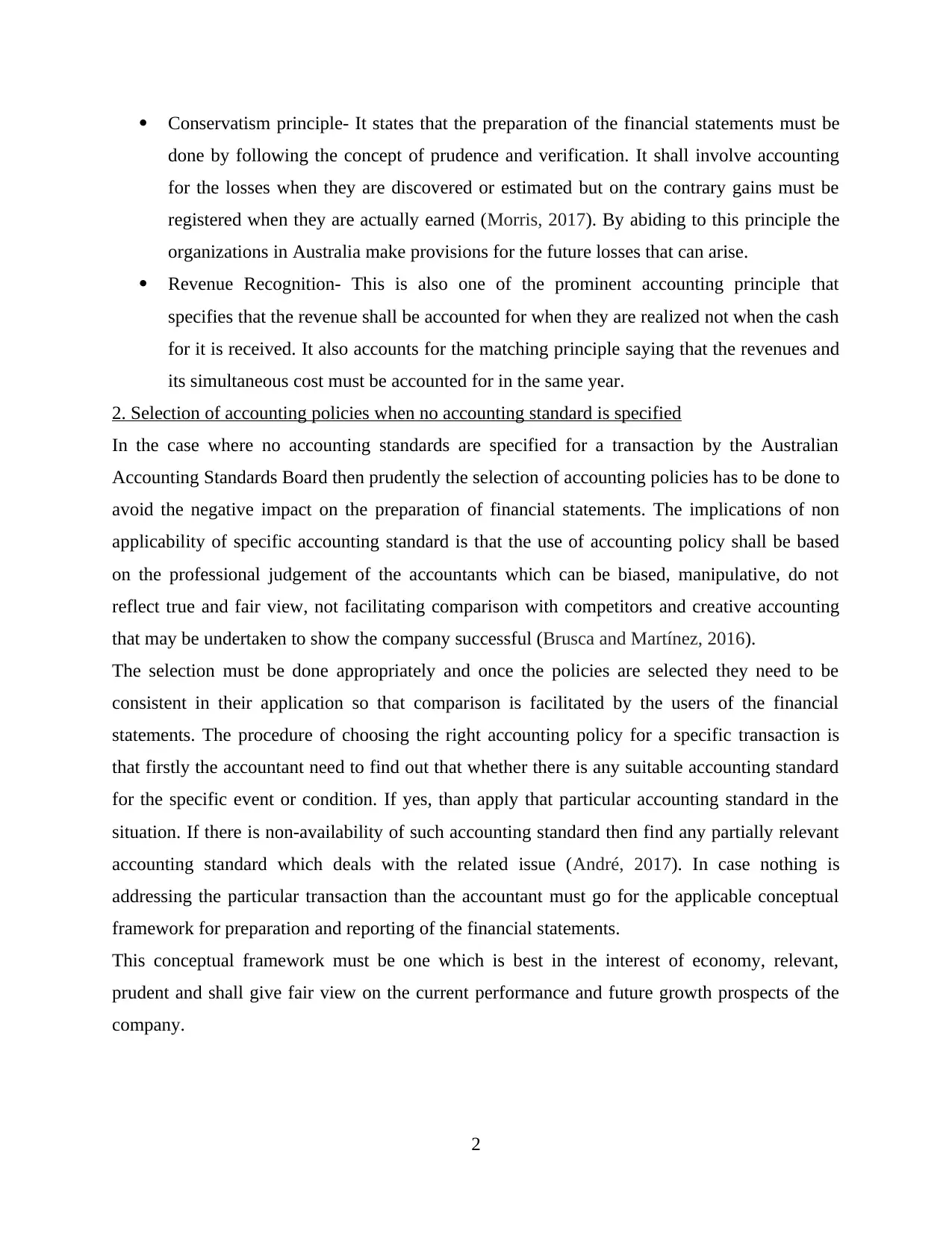
Conservatism principle- It states that the preparation of the financial statements must be
done by following the concept of prudence and verification. It shall involve accounting
for the losses when they are discovered or estimated but on the contrary gains must be
registered when they are actually earned (Morris, 2017). By abiding to this principle the
organizations in Australia make provisions for the future losses that can arise.
Revenue Recognition- This is also one of the prominent accounting principle that
specifies that the revenue shall be accounted for when they are realized not when the cash
for it is received. It also accounts for the matching principle saying that the revenues and
its simultaneous cost must be accounted for in the same year.
2. Selection of accounting policies when no accounting standard is specified
In the case where no accounting standards are specified for a transaction by the Australian
Accounting Standards Board then prudently the selection of accounting policies has to be done to
avoid the negative impact on the preparation of financial statements. The implications of non
applicability of specific accounting standard is that the use of accounting policy shall be based
on the professional judgement of the accountants which can be biased, manipulative, do not
reflect true and fair view, not facilitating comparison with competitors and creative accounting
that may be undertaken to show the company successful (Brusca and Martínez, 2016).
The selection must be done appropriately and once the policies are selected they need to be
consistent in their application so that comparison is facilitated by the users of the financial
statements. The procedure of choosing the right accounting policy for a specific transaction is
that firstly the accountant need to find out that whether there is any suitable accounting standard
for the specific event or condition. If yes, than apply that particular accounting standard in the
situation. If there is non-availability of such accounting standard then find any partially relevant
accounting standard which deals with the related issue (André, 2017). In case nothing is
addressing the particular transaction than the accountant must go for the applicable conceptual
framework for preparation and reporting of the financial statements.
This conceptual framework must be one which is best in the interest of economy, relevant,
prudent and shall give fair view on the current performance and future growth prospects of the
company.
2
done by following the concept of prudence and verification. It shall involve accounting
for the losses when they are discovered or estimated but on the contrary gains must be
registered when they are actually earned (Morris, 2017). By abiding to this principle the
organizations in Australia make provisions for the future losses that can arise.
Revenue Recognition- This is also one of the prominent accounting principle that
specifies that the revenue shall be accounted for when they are realized not when the cash
for it is received. It also accounts for the matching principle saying that the revenues and
its simultaneous cost must be accounted for in the same year.
2. Selection of accounting policies when no accounting standard is specified
In the case where no accounting standards are specified for a transaction by the Australian
Accounting Standards Board then prudently the selection of accounting policies has to be done to
avoid the negative impact on the preparation of financial statements. The implications of non
applicability of specific accounting standard is that the use of accounting policy shall be based
on the professional judgement of the accountants which can be biased, manipulative, do not
reflect true and fair view, not facilitating comparison with competitors and creative accounting
that may be undertaken to show the company successful (Brusca and Martínez, 2016).
The selection must be done appropriately and once the policies are selected they need to be
consistent in their application so that comparison is facilitated by the users of the financial
statements. The procedure of choosing the right accounting policy for a specific transaction is
that firstly the accountant need to find out that whether there is any suitable accounting standard
for the specific event or condition. If yes, than apply that particular accounting standard in the
situation. If there is non-availability of such accounting standard then find any partially relevant
accounting standard which deals with the related issue (André, 2017). In case nothing is
addressing the particular transaction than the accountant must go for the applicable conceptual
framework for preparation and reporting of the financial statements.
This conceptual framework must be one which is best in the interest of economy, relevant,
prudent and shall give fair view on the current performance and future growth prospects of the
company.
2
Paraphrase This Document
Need a fresh take? Get an instant paraphrase of this document with our AI Paraphraser

CONCLUSION
The project is showing the applicability of accounting standards and relevant policies in the
preparation of the financial statements of the company. Further it is disclosing the way to
prudently select the principles in the absence of accounting standards.
3
The project is showing the applicability of accounting standards and relevant policies in the
preparation of the financial statements of the company. Further it is disclosing the way to
prudently select the principles in the absence of accounting standards.
3
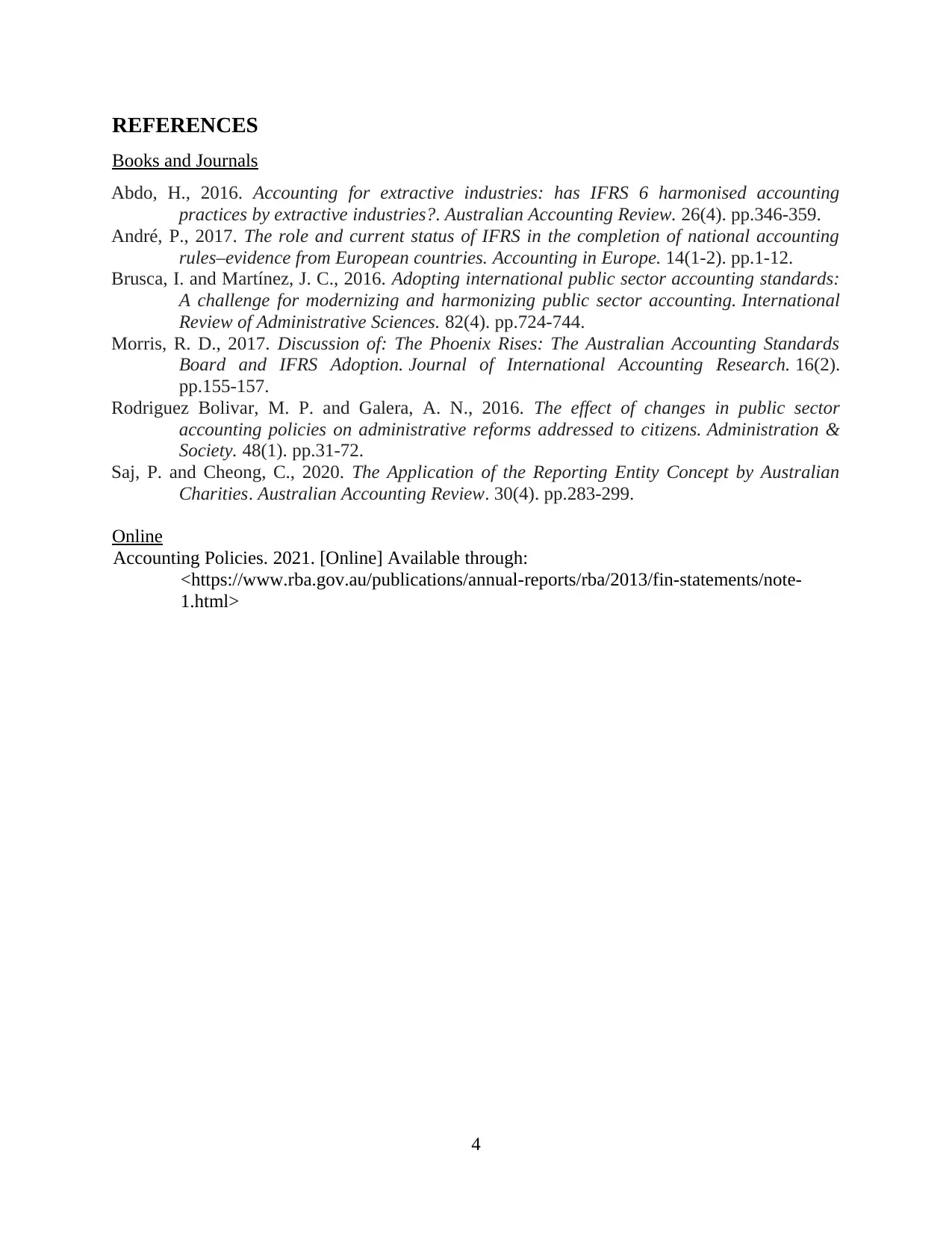
REFERENCES
Books and Journals
Abdo, H., 2016. Accounting for extractive industries: has IFRS 6 harmonised accounting
practices by extractive industries?. Australian Accounting Review. 26(4). pp.346-359.
André, P., 2017. The role and current status of IFRS in the completion of national accounting
rules–evidence from European countries. Accounting in Europe. 14(1-2). pp.1-12.
Brusca, I. and Martínez, J. C., 2016. Adopting international public sector accounting standards:
A challenge for modernizing and harmonizing public sector accounting. International
Review of Administrative Sciences. 82(4). pp.724-744.
Morris, R. D., 2017. Discussion of: The Phoenix Rises: The Australian Accounting Standards
Board and IFRS Adoption. Journal of International Accounting Research. 16(2).
pp.155-157.
Rodriguez Bolivar, M. P. and Galera, A. N., 2016. The effect of changes in public sector
accounting policies on administrative reforms addressed to citizens. Administration &
Society. 48(1). pp.31-72.
Saj, P. and Cheong, C., 2020. The Application of the Reporting Entity Concept by Australian
Charities. Australian Accounting Review. 30(4). pp.283-299.
Online
Accounting Policies. 2021. [Online] Available through:
<https://www.rba.gov.au/publications/annual-reports/rba/2013/fin-statements/note-
1.html>
4
Books and Journals
Abdo, H., 2016. Accounting for extractive industries: has IFRS 6 harmonised accounting
practices by extractive industries?. Australian Accounting Review. 26(4). pp.346-359.
André, P., 2017. The role and current status of IFRS in the completion of national accounting
rules–evidence from European countries. Accounting in Europe. 14(1-2). pp.1-12.
Brusca, I. and Martínez, J. C., 2016. Adopting international public sector accounting standards:
A challenge for modernizing and harmonizing public sector accounting. International
Review of Administrative Sciences. 82(4). pp.724-744.
Morris, R. D., 2017. Discussion of: The Phoenix Rises: The Australian Accounting Standards
Board and IFRS Adoption. Journal of International Accounting Research. 16(2).
pp.155-157.
Rodriguez Bolivar, M. P. and Galera, A. N., 2016. The effect of changes in public sector
accounting policies on administrative reforms addressed to citizens. Administration &
Society. 48(1). pp.31-72.
Saj, P. and Cheong, C., 2020. The Application of the Reporting Entity Concept by Australian
Charities. Australian Accounting Review. 30(4). pp.283-299.
Online
Accounting Policies. 2021. [Online] Available through:
<https://www.rba.gov.au/publications/annual-reports/rba/2013/fin-statements/note-
1.html>
4
⊘ This is a preview!⊘
Do you want full access?
Subscribe today to unlock all pages.

Trusted by 1+ million students worldwide
1 out of 6
Related Documents
Your All-in-One AI-Powered Toolkit for Academic Success.
+13062052269
info@desklib.com
Available 24*7 on WhatsApp / Email
![[object Object]](/_next/static/media/star-bottom.7253800d.svg)
Unlock your academic potential
Copyright © 2020–2026 A2Z Services. All Rights Reserved. Developed and managed by ZUCOL.




